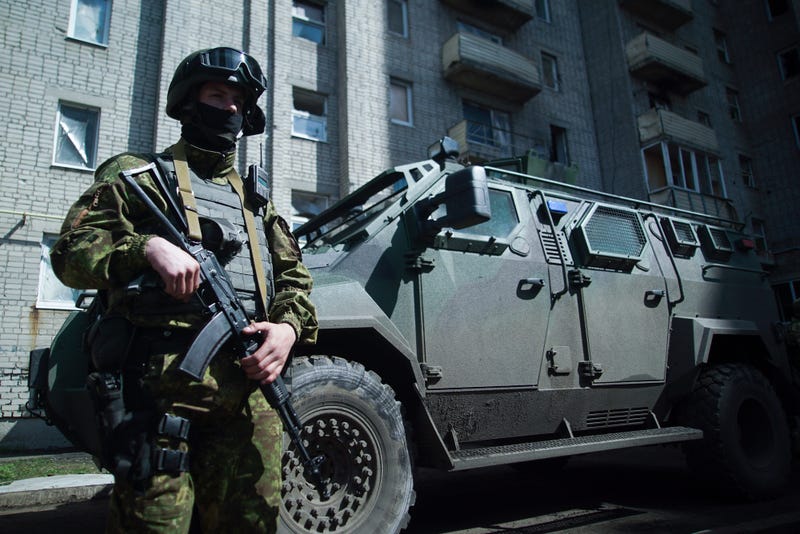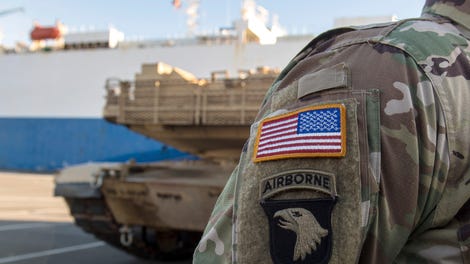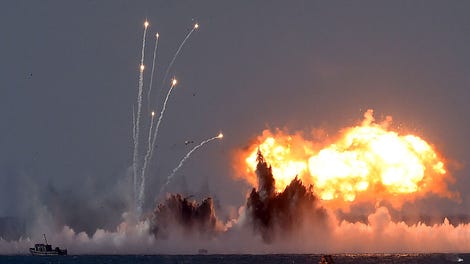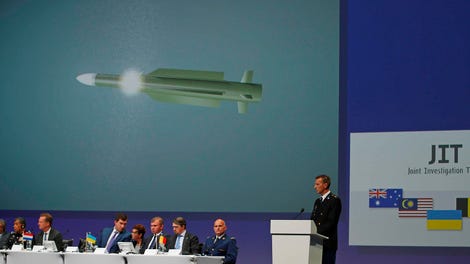
Seven Ukrainian troops have been killed since Sunday fighting against Russia-backed rebels in the eastern Ukrainian town of Avdiivka. The deaths are the most on record since December, when 17 soldiers were killed. In total 16 Ukrainian troops have died in combat this month. So why are we talking about lifting American economic sanctions against Moscow now?
Advertisement
Ironically, the escalation in fighting started on Sunday, a day after President Donald Trump’s phone call with Russian President Vladimir Putin. The two leaders did not discuss sanctions in depth, but deadly battles taking place since then could very be a test of how much America will allow Putin to get away with in eastern Ukraine. Currently the sanctions are one of the only things keeping Russia somewhat in check in Ukraine.
In what is clearly a shot at Trump, Ukrainian Petro Poroshenko is seen on video asking, “Who would dare talking about lifting the sanctions in such circumstances?”
Advertisement
Kyiv claims the recent fighting began when rebels launched an attack on government-controlled Avdiivka, which borders separatist-controlled territory. Russia is blaming Ukrainian troops for the uptick in fighting. The AFP reports that rebels have been firing Grad multiple rocket systems and artillery fire since the early morning. It is not known if there are any rebel casualties.
Concerns abound in Europe and Kyiv that Washington may drop its sanctions against Moscow. In the summer of 2014, then-President Barack Obama coordinated with Brussels to levy damaging economic sanctions against the Kremlin for invading eastern Ukraine and annexing Crimea; the move was the most robust punishment against Moscow since the fall of the Soviet Union.
As Foxtrot Alpha has previously reported, the Brussels-Washington sanctions contributed to a sharp contraction in Russia’s GDP and have slowed the country’s economic recovery. Meanwhile, Putin has long denied that Russian combat troops are in eastern Ukraine, despite clear evidence to the contrary.
Sponsored
Making matters worse is the onslaught of shelling taking place in the industrial town of 20,000 has lead to heating and electricity outages that can potentially turn into a humanitarian crisis. No official evacuation is underway, but government officials say they are sending food to the town and are prepared to move as 9,000 people per day to surrounding towns if needed.
“Right now, there is no power. We have not resolved problems with heating homes, and the gas pipe has been shattered,” a local Ukrainian army spokeswoman told AFP.
Advertisement
Advertisement
During a recent trip to Kyiv, George Tuka, a deputy minister in charge helping to settle the conflict peacefully told me that if sanctions are lifted, he will have little leverage with which to negotiate with the rebels. Furthermore, he said that the conflict has little to do with ethnic strife, but with Moscow’s interference in complex local affairs.
“This is not the problem between two neighbors,” Tuka told me.
Avdiika is an extremely vital battleground for the Ukrainian military. If Ukraine loses it to the rebels, it will be an enormous blow to Kyiv, militarily and psychologically. It will also deepen Russia’s encroachment in Ukraine and signal to Putin that he will not suffer consequences for violating Ukraine’s sovereignty.
Advertisement
Because Ukraine is not a NATO member, the alliance has no obligation to support it, and Putin knows this.
The war in eastern Ukraine has taken the lives of nearly 10,000 people since March 2014, when fighting between rebels and Ukrainian forces was at its peak. A series of peace talks through the Minsk Peace Accord have produced little to no progress in ending the conflict. Much of the failure of the Minsk Accord has to do with the fact that Putin has no incentive to end the conflict. Like the situation with breakaway regions South Ossetia and Abkhazia, in Georgia, and Transnistia, in Moldova, Putin is in control.
The tactic of using the military in weak ex-Soviet states has been a common geopolitical Kremlin tool to force Russian homogeny on neighbors who neither want it nor can fight against it. The fighting, eventually may end, but no political resolution ever seems to follow. The Kremlin, consequently, functions as the de facto head of state. These situations are referred to as “frozen conflicts.”
Advertisement
Advertisement
The danger with frozen conflicts is that they are powder kegs waiting to explode and are a constant danger to the residents impacted by them and points of instability that can cause refugee crisis, famine and ongoing violence. That is why sanctions have been such a powerful tool against Putin. The more economic pressure against an actor advancing destabilizing tactics, the more, at least over time, the actor is inclined to wonder if their behavior is worth it. They are the best measures to take on a country short of all out war or hybrid cyberattacks, for example.
If taken off the table, the bad actor will feel emboldened to do as she or he pleases. That is likely what is happening in Avdiivka. No one in the White House is reaffirming the commitment to U.S. sanctions or NATO. No one is telling Putin to keep his hands off Ukraine. Consequently, he’ll believe it is his for the taking.
And it appears that Trump wouldn’t care if rebels did take over the town. Avdiivka may be just the beginning of what could be another major war in Ukraine’s east that can creep even closer to Kyiv.
















